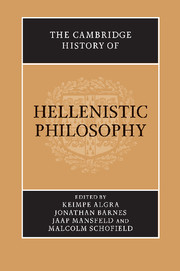Book contents
- Frontmatter
- PART I INTRODUCTION
- PART II LOGIC AND LANGUAGE
- PART III EPISTEMOLOGY
- PART IV PHYSICS AND METAPHYSICS
- PART V ETHICS AND POLITICS
- 19 The Socratic legacy
- 20 Epicurean ethics
- 21 Stoic ethics
- 22 Social and political thought
- Epilogue
- Synopsis of principal events
- Editions of sources and fragments
- List of abbreviations
- Bibliography
- Index locorum
- General Index
- References
22 - Social and political thought
from PART V - ETHICS AND POLITICS
Published online by Cambridge University Press: 28 March 2008
- Frontmatter
- PART I INTRODUCTION
- PART II LOGIC AND LANGUAGE
- PART III EPISTEMOLOGY
- PART IV PHYSICS AND METAPHYSICS
- PART V ETHICS AND POLITICS
- 19 The Socratic legacy
- 20 Epicurean ethics
- 21 Stoic ethics
- 22 Social and political thought
- Epilogue
- Synopsis of principal events
- Editions of sources and fragments
- List of abbreviations
- Bibliography
- Index locorum
- General Index
- References
Summary
Introduction
Hellenistic political philosophy has had a bad press. In lectures published in 1983 the distinguished and influential ancient historian Moses Finley gave it as his view that Plato and Aristotle ‘were the first genuine political theorists of antiquity, and the last’. For only they attempted ‘a complete and coherent account’ of the ideal society ‘grounded in systematic metaphysics, epistemology, psychology and ethics’. Some thirty years earlier, in what remains an eminently serviceable general account of Greek political thought, T. A. Sinclair wrote as follows:
Looking back over the political thought of the third century BC one cannot help being struck with its barrenness. This is of course due in part to the decline in the polis and in part to the loss of contemporary writings on the subject. But it is also due to the refusal or inability to relate political thinking to the material conditions in which men lived. Epicurus and Chrysippus did their best to help men to face life cheerfully, but the men whom they helped were the few, who had sufficient education to understand their message and sufficient leisure for lessons in philosophy.
Finley and Sinclair are only echoing a long entrenched judgement which finds a classic formulation in the third volume of Zeller's great history of Greek philosophy, first published in 1852. For Zeller the Hellenistic period found the Greeks coping with a deterioration in their external circumstances, and particularly with loss of political self-determination as the monarchies of Alexander's successors eclipsed the city-state, by withdrawing into the inner world of self-consciousness.
- Type
- Chapter
- Information
- The Cambridge History of Hellenistic Philosophy , pp. 739 - 770Publisher: Cambridge University PressPrint publication year: 1999
References
- 55
- Cited by



